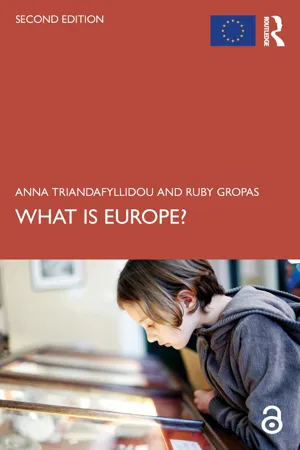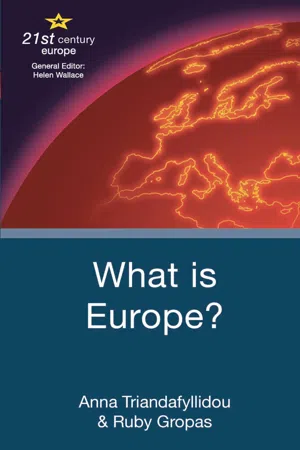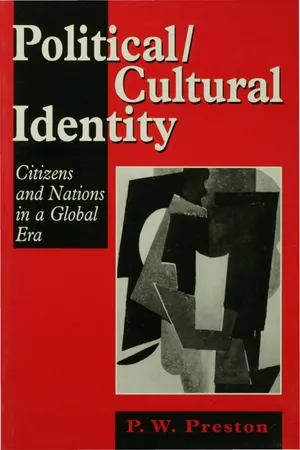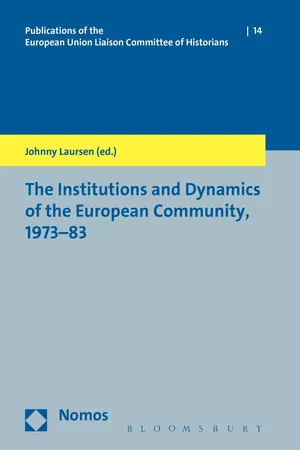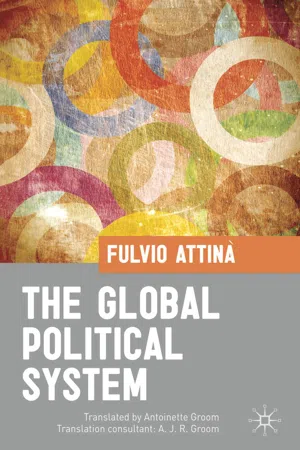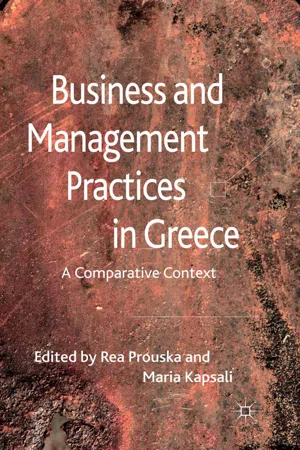History
Political Changes In Europe
"Political Changes in Europe" refers to the series of transformations in governance, power structures, and ideologies across the continent. These changes have been shaped by events such as revolutions, wars, and the rise and fall of empires. They have led to the establishment of new political systems, the redrawing of borders, and shifts in international relations, influencing the course of European history.
Written by Perlego with AI-assistance
Related key terms
1 of 5
6 Key excerpts on "Political Changes In Europe"
- eBook - ePub
- Anna Triandafyllidou, Ruby Gropas(Authors)
- 2022(Publication Date)
- Routledge(Publisher)
Examining the political dimensions that define or contribute to our understanding of what Europe is essentially requires one to navigate between continuity and change. The twentieth century has been a period of deep transformation that has culminated in a Union of member states that by and large aims to represent the long-aspired ideals of peace, unity, and democracy. These accomplishments were severely challenged by the euro crisis and its consequences, as well as the rise of illiberal authoritarianism and far-right populists. But to better understand today’s undercurrents of political change within and across Europe, it is useful to take a closer look at the transformations that occurred during the twentieth century on the European political landscape:the transformation of the European state through progressive European integration; the redrawing of the boundaries between public and private (nationalisation and, later, privatisation), as well as the readjustment of territorial boundaries through decentralisation, regionalisation and federalisation; changes in patters of democratic participation, protest, elections and political communication; the changing character of political parties and changing patterns of party competition; the new challenges faced the European welfare states; and changes in the organization and style of executive government.(Goetz, Mair and Smith 2008 , p. 40)These changes have altered both the character of Europe and our understanding of it. Today, any discussion of European politics or of politics in Europe is defined by the European Union, even if by contrast rather than consensus or support. Since the 1980s, researchers have been examining the effects of the EU on democratic politics within and across the member states. One of the core concerns was whether European integration could remain a broadly consensual elite project detached from domestic political competition. Another was how the democratic deficit that characterised the EU could be addressed to protect the quality of democracy within the nation-states. In essence these issues raised the overarching question of whether European integration might constitute a new political cleavage, one pitting the winners of globalisation against the losers (Hooghe and Marks 2008 - eBook - ePub
- Anna Triandafyllidou, Ruby Gropas(Authors)
- 2015(Publication Date)
- Bloomsbury Academic(Publisher)
A more diverse reading of the post-communist political landscape of Central and Eastern Europe was put forward by Stephen Whitefield (2002). He argued that political cleavages emerged in each state across the region, reflecting the country’s historical inheritances as well as its post-communist economic and social experiences. He made the case that communist rule did not destroy social identities of class, religion, region and ethnicity, which were to prove immediate sources of division; rather the contrary, he argued, it probably maintained them and even stimulated them. Studies of Europe’s post-communist democracies have emphasized the lack of institutionalization of patterns of government and opposition (characteristic of Western Europe) and the fragmentation of their political systems. However, recent studies have exposed a significant confluence between East and West to a much wider degree than previously expected (Albertazzi and Mueller, 2013; Best, 2013; Casal Bertoa, 2013; van Biezen and Wallace, 2013). European politics transformed Examining the political dimensions that define or contribute to our understanding of what Europe is essentially requires one to navigate between continuity and change. The twentieth century has been a period of deep transformation that has culminated in the present reality of a Union of 28 member states that by and large represent the long-aspired-to ideals of peace, unity and democracy. These accomplishments may at present be severely challenged by the euro crisis and its consequences, but in order to better understand today’s undercurrents of political change within and across Europe it is useful to take a closer look at the transformations that occurred during the twentieth century on the European political landscape. First, many analysts have argued that in the course of the twentieth century there has been a transition from modern to post-modern politics - eBook - PDF
Political/Cultural Identity
Citizens and Nations in a Global Era
- P W Preston(Author)
- 1997(Publication Date)
- SAGE Publications Ltd(Publisher)
European routes to the modern world The recent processes of structural reconfiguration which have enfolded Europe have occasioned a series of responses, elit e and popular, which range from enthusiasm through to deep disquiet. It can be suggested that the spread of present reactions have a common starting-point in an arguably rather conservative view of Europe's recent history. The 96 Political/cultural identity arrangements of the long post-Second World War period of US hege-mony had come to be seen as likely to endure indefinitely, with the western half of the continent assimilated into an Anglo-American market-based capitalism while the eastern half of continental Europe pursued a state-directed socialism. These divisions found emphatic expression in the ideological rhetoric of cold war. However, it is clear that the patterns of life, economic arrangements and broader regional institutional structures were quite particular to the post-Second World War period. More broadly, the history of Europe can be seen to comprise a series of political-economic, social-institutional and cultural configurations. The historical and comparative social theorist B. Moore (1966) ad-dressed these matters in terms of the historical trajectories followed by particular countries as they made the awkward and often deeply problematica l shift to the modern world. In the case of Western Europe it is possible to point to broad patterns of structural change and to detail the ways in which political elit es read and reacted to these changes in order to establish political projects which would offer them some sort of route to the future. The history of Europe can be read as a series of structural patterns, carrying a diversity of political projects, which in turn issued in the creation of a variety of political-cultural identities which were finally assimilated to the routines of ordinary people. - Johnny Laursen(Author)
- 2015(Publication Date)
- Nomos/Bloomsbury(Publisher)
Policy impact: Europeanisation The third key structural change in the period covered by this book is the growing actual impact of EC politics and policy-making on the member 22 Cf. L.N. LEUSTEAN (ed.), Religion, Politics and Law in the European Union , (Abingdon: Routledge, 2009). 23 For a political science analysis of the role of the ERT in the origins of the single market agenda see M. GREEN COWLES, ’Setting the Agenda for a New Europe. The ERT and the EC 1992’, Journal of Common Market Studies , vol. 33, no. 4 (1993), 501-526. Political Dynamics in an Emerging Polity 59 states. In the past the term Europeanisation has been too loosely applied by political scientists to cover a variety of diverse phenomena. 24 In fact, its most promising application as a conceptual framework might well be to under-standing better different ways of “making Europe” as transnational and in-tercultural, political, social or cultural practice – rather than structural (po-litical) process. 25 However, the term can also be used to conceptualize the impact of EC politics and policy-making on the institutional, judicial, eco-nomic and social structures and ways of doing things of the member states and accession states. Incipient research on the effects of integration on the member states has mainly focussed on how they and national societal actors adapted to the new policy- and decision-making environment, as in the case of the adjustment of the German agricultural policy community to, and its role in, the emergence of the Common Agricultural Policy (CAP) in the 1960s. 26 Europeanization as legal-institutional adoption of the so-called acquis communautaire is especially relevant to the enlargements of the long 1970s: to include Britain, Denmark and Ireland in 1973 and Greece in 1981 as well as during the accession negotiations and in anticipation of enlargement in 24 For an overview of different political science conceptualisations see still J.P.- eBook - PDF
- Fulvio Attina(Author)
- 2011(Publication Date)
- Red Globe Press(Publisher)
Chapter 5 Global Political Change The study and knowledge of change in the world political system are not very highly developed. Political scientists prefer to analyse the constants of the system rather than the causes and forms of change. Realists consider change merely to be the effects of conflict among the great powers, while neo-realists, who place the structure of the distribution of force in an historical context at the centre of the system, see international political change as a passage from one structure to another without explaining the causes of the passage. Hegemonic theory pays more atten-tion to the analysis of change. Gilpin (1981), for example, wanted to explain the causes of the rise and decline of hegemonic states and recog-nized the importance of considering both long-term and short-term factors. In the equality paradigm more attention is paid to change. Theories of social order suggest that international institutions change in the long term due to cultural and technical factors. Generally, they explain the spread of change by relating it to the power of the states which belong to the dominant culture and are technologically more advanced. Pluralist theorists also show great interest in change but only a few distin-guish between long-term and short-term analyses. However, James Rosenau (1990) adopts a theory of complexity to explain why, in the world system, evolutionary and gradual change are coupled with sudden change and points of rupture. Rosenau’s choice is close to that of the historian John Lewis Gaddis (1987) who, borrowing a geological term, calls tectonic changes those radical changes of the international system which cannot be explained otherwise than through emphasizing processes which, having escaped the attention of scholars, cannot be halted once they have begun. - eBook - PDF
Business and Management Practices in Greece
A Comparative Context
- R. Prouska, M. Kapsali, R. Prouska, M. Kapsali(Authors)
- 2011(Publication Date)
- Palgrave Macmillan(Publisher)
The impact of politics on business practices and the economy is now a poisoned chalice for Greek politi- cians, who are aware of the internal structural problems and that they are (considered to be) part of the problem (Beesley, 2010). There are a number of themes arising from this chapter that are fun- damental to understanding the other chapters. The first theme is that 4 Politics throughout Modern Greek history (1830 to present) outside forces have actively interfered and even intervened in political and social affairs very much in a colonial way. Greece geographically is on the south-east periphery of Europe, right at the crossroads between Western Europe, the Balkans (recently under the influence of the former Soviet Union), the Middle East (under the influence of Islamic cultures) and North-east Africa. The constant contact with this eastern Mediterranean cocktail of cultures and socioeconomic systems, which has been causing turbulent global historical events for centuries, exposes the country to levels of complexity and uncertainty verging on chaos, and the evolution of habits that it is difficult to understand without the help of anthropolo- gists. On a practical level, Greece’s position on the southeast flank of Europe is hugely strategic, and for that reason the country is being pulled in different directions to compromise with various (and often conflicting) forces, which have often explicitly interfered, taking the role of the ‘pro- tector’ or patron. In the last century alone, Greece has been affected by two World Wars, the Great Depression, a civil war, the Cold War, seven military coups, numerous ‘local’ wars (with the Balkans and with Turkey), the oil crisis and other economic pressures, the political and monetary integration with EEC (European Economic Community)/EU (European Union) and the latest global ‘crunch’. During all these (often violent) events, the country was to be outnumbered and financially exhausted.
Index pages curate the most relevant extracts from our library of academic textbooks. They’ve been created using an in-house natural language model (NLM), each adding context and meaning to key research topics.
